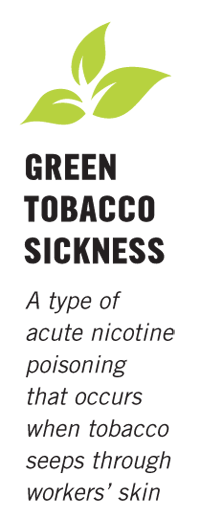Eddie Ramirez, 15, has worked in the tobacco fields to help his mother with bills ever since his father was deported to Honduras. All photos by the author
Eddie Ramirez doesn't smoke, but nicotine still makes him feel "lightheaded sometimes," like he's "going to vomit." That's because he's one of the estimated thousands of kids who work in American tobacco fields, enduring long, hot days pruning plants whose leaves will be sold to big tobacco companies like Reynolds American and Japan Tobacco International, which turn the crop into Camels and Pall Malls. Green tobacco sickness, a type of acute nicotine poisoning, occurs when tobacco seeps through workers' skin, and one report found that as many as three quarters of young tobacco workers experience symptoms like dizziness, headaches, nausea, and vomiting. Ramirez showed me his hand when we were out among the sun-yellowed tobacco stalks of Snow Hill, North Carolina, where he works. "You feel how it's sticky?" he asked, rubbing his thumb and forefinger together. "That's the nicotine." In the US, it's perfectly legal for Ramirez, who is 15 and just started high school, to work in these fields. He began working at 12, the minimum legal age, lower than in any other industry in America. In 2011, former labor secretary Hilda Solis tried and failed to raise the federal age for farm work to 16, and recently NGOs have tried another approach: targeting the tobacco industry's major players, like Philip Morris International, to get them to raise the age of the workers in their supply chain. Margaret Wurth, the author of a May 2014 Human Rights Watch report about children and teens who labor in the tobacco fields, believes that the age to harvest tobacco should be raised to 18. "This is a kind of work that children just shouldn't be doing," she argues. "It's too dangerous for them."For Ramirez—and many immigrants from Mexico and Central America, who make up about 83 percent of agricultural workers in the US—the health risks are worth taking. "My dad's not here, you know, so I help my mom a lot," Ramirez explains. Because his dad was deported to Honduras, what he makes working 12- and sometimes 13-hour days, often at $8.75 an hour ($1.50 more than minimum wage), goes to rent and food. It's a big help to his mom, who works in a sweet-potato-processing plant. She used to work in tobacco but became too sick. "The nicotine got to her real bad," he explains. "We had to take her to the hospital."
In the US, it's perfectly legal for Ramirez, who is 15 and just started high school, to work in these fields. He began working at 12, the minimum legal age, lower than in any other industry in America. In 2011, former labor secretary Hilda Solis tried and failed to raise the federal age for farm work to 16, and recently NGOs have tried another approach: targeting the tobacco industry's major players, like Philip Morris International, to get them to raise the age of the workers in their supply chain. Margaret Wurth, the author of a May 2014 Human Rights Watch report about children and teens who labor in the tobacco fields, believes that the age to harvest tobacco should be raised to 18. "This is a kind of work that children just shouldn't be doing," she argues. "It's too dangerous for them."For Ramirez—and many immigrants from Mexico and Central America, who make up about 83 percent of agricultural workers in the US—the health risks are worth taking. "My dad's not here, you know, so I help my mom a lot," Ramirez explains. Because his dad was deported to Honduras, what he makes working 12- and sometimes 13-hour days, often at $8.75 an hour ($1.50 more than minimum wage), goes to rent and food. It's a big help to his mom, who works in a sweet-potato-processing plant. She used to work in tobacco but became too sick. "The nicotine got to her real bad," he explains. "We had to take her to the hospital." People's sensitivity to nicotine varies. Thomas Arcury, a public-health scientist at Wake Forest University, found that 25 percent of adult workers who handle tobacco experience symptoms of green tobacco sickness. Ramirez tries to protect himself from the nicotine-filled early-morning dew, which can soak through clothes and into the skin, by wearing a trash bag over his body. He cuts holes in the sides for his arms and slips the black bag over his head. In spite of his homemade getup, he says, "You still get wet."No one knows the effects of exposure in the long term, especially on kids whose bodies and nervous systems aren't yet fully developed. What scientists do know is that nicotine absorbed through the skin is metabolized into something called cotinine, which is then measured to assess how much nicotine is in a person's system. At the end of the 1999 tobacco harvest in Wake and Granville counties, in rural North Carolina, one study found that nonsmoking adult workers had cotinine levels comparable to what you'd expect to find in someone who smokes a quarter pack a day. Although there aren't the same risks involved as those associated with smoking, like lung cancer, exposure to nicotine during adolescence may have adverse effects on brain development, according to the US surgeon general.
People's sensitivity to nicotine varies. Thomas Arcury, a public-health scientist at Wake Forest University, found that 25 percent of adult workers who handle tobacco experience symptoms of green tobacco sickness. Ramirez tries to protect himself from the nicotine-filled early-morning dew, which can soak through clothes and into the skin, by wearing a trash bag over his body. He cuts holes in the sides for his arms and slips the black bag over his head. In spite of his homemade getup, he says, "You still get wet."No one knows the effects of exposure in the long term, especially on kids whose bodies and nervous systems aren't yet fully developed. What scientists do know is that nicotine absorbed through the skin is metabolized into something called cotinine, which is then measured to assess how much nicotine is in a person's system. At the end of the 1999 tobacco harvest in Wake and Granville counties, in rural North Carolina, one study found that nonsmoking adult workers had cotinine levels comparable to what you'd expect to find in someone who smokes a quarter pack a day. Although there aren't the same risks involved as those associated with smoking, like lung cancer, exposure to nicotine during adolescence may have adverse effects on brain development, according to the US surgeon general. In North Carolina, where it seems almost every man over a certain age grew up priming tobacco on his daddy's farm, to some the risks of green tobacco sickness don't seem alarming. "We called it the 'mean green' thirty years ago," says Graham Boyd, the vice president of the state's Tobacco Growers Association. "I was one of these people who suffered from it every day," he says, recalling the symptoms he experienced working in the hot sun starting from the age of 12 or 13. He says his own 16- and 17-year-old children "are large enough that I don't see an issue with them working in a field like this with regards to the safety factor," even though his own children don't work in the fields.It's unclear who is most invested in keeping the minimum age at 12. The Tobacco Growers Association of North Carolina, following in the footsteps of another growers' association, the Council for Burley Tobacco in Kentucky, has come forward to officially say that it doesn't condone anyone under the age of 16 working. Of the eight major companies that buy tobacco leaves from farms in North Carolina, Philip Morris International has been willing to engage in a dialogue about children working on farms it does business with, detailing a list of hazardous tasks laborers under 18 should be prohibited from doing.But while big tobacco has expressed concern, there has been little action. "We believe tobacco companies have responsibilities to adopt clear policies to prohibit children from doing dangerous work on farms in their supply chains," Wurth, of Human Rights Watch, tells me. "The companies continue to say that they are concerned with child labor in their supply chains, but we haven't seen meaningful changes in their policies."
In North Carolina, where it seems almost every man over a certain age grew up priming tobacco on his daddy's farm, to some the risks of green tobacco sickness don't seem alarming. "We called it the 'mean green' thirty years ago," says Graham Boyd, the vice president of the state's Tobacco Growers Association. "I was one of these people who suffered from it every day," he says, recalling the symptoms he experienced working in the hot sun starting from the age of 12 or 13. He says his own 16- and 17-year-old children "are large enough that I don't see an issue with them working in a field like this with regards to the safety factor," even though his own children don't work in the fields.It's unclear who is most invested in keeping the minimum age at 12. The Tobacco Growers Association of North Carolina, following in the footsteps of another growers' association, the Council for Burley Tobacco in Kentucky, has come forward to officially say that it doesn't condone anyone under the age of 16 working. Of the eight major companies that buy tobacco leaves from farms in North Carolina, Philip Morris International has been willing to engage in a dialogue about children working on farms it does business with, detailing a list of hazardous tasks laborers under 18 should be prohibited from doing.But while big tobacco has expressed concern, there has been little action. "We believe tobacco companies have responsibilities to adopt clear policies to prohibit children from doing dangerous work on farms in their supply chains," Wurth, of Human Rights Watch, tells me. "The companies continue to say that they are concerned with child labor in their supply chains, but we haven't seen meaningful changes in their policies." Despite the health hazards, however, many of the children's families rely on their paychecks. "If I didn't work, we wouldn't get what we actually need," says Saray Cambray Alvarez, a 13-year-old who works in the tobacco fields of Pink Hill, a county over from Snow Hill. Alvarez's whole family work as farm laborers, traveling between tobacco fields in North Carolina and orange groves in Florida, and Saray is expected to work and help her family survive."If [the parents of kids like Alverez and Ramirez] were earning more money," says labor-union representative and former farmworker David Flores, "they wouldn't need their kids to work in the field."Yet for Eddie Ramirez, it's easier to stomach the nicotine than the alternative. "I see my mom working. She comes home late. She doesn't earn enough money," he says. "It feels good to provide her with some backup."
Despite the health hazards, however, many of the children's families rely on their paychecks. "If I didn't work, we wouldn't get what we actually need," says Saray Cambray Alvarez, a 13-year-old who works in the tobacco fields of Pink Hill, a county over from Snow Hill. Alvarez's whole family work as farm laborers, traveling between tobacco fields in North Carolina and orange groves in Florida, and Saray is expected to work and help her family survive."If [the parents of kids like Alverez and Ramirez] were earning more money," says labor-union representative and former farmworker David Flores, "they wouldn't need their kids to work in the field."Yet for Eddie Ramirez, it's easier to stomach the nicotine than the alternative. "I see my mom working. She comes home late. She doesn't earn enough money," he says. "It feels good to provide her with some backup."
Advertisement

Advertisement


Advertisement

